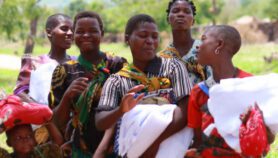By: Priya Shetty
Send to a friend
The details you provide on this page will not be used to send unsolicited email, and will not be sold to a 3rd party. See privacy policy.
New funding and concrete results are paving the way for scaling up mhealth technologies — but carefully, writes Priya Shetty.
Five years ago, the way that mobile phones and computers would transform the provision of healthcare provision in low-resource countries seemed straightforward. Doctors and nurses could send SMS reminders to patients to take HIV or TB drugs, for instance, or rapidly gather data on infectious diseases to feed into pandemic surveillance systems.
Yet the early promise never quite materialised. These methods were untested and radically different to conventional methods, so few governments or research funders backed studies, and the little evidence for effectiveness came from small pilot studies.
The absence of a research network in this area also meant that, often, health professionals in different countries duplicated each other’s work.
Now, studies funded by the Bill & Melinda Gates Foundation and the Rockefeller Foundation have spurred innovation in the field, and are starting to provide evidence for what works.
Going mobile
The benefit of healthcare that can reach even the most remote locations in an instant has obvious appeal for developing countries, where many people live in rural areas with few healthcare workers. There is a global deficit of 2.4 million doctors, nurses, and midwives, and the WHO says that 57 countries have a chronic shortage of healthcare workers.
Mobile health (mHealth) technologies can also address social sensitivities related to illness. A South African health programme called iTeach sends information via SMS about local HIV clinics, for example. Receiving this information on a personal phone means that the patient’s privacy remains intact — they don’t risk bumping into their neighbours at their general health clinic.
Information can flow the other way too, and mobile phones or laptops can be used to send real-time alerts about medicine shortages or disease outbreaks from remote areas, allowing healthcare professionals to keep pace with — and even anticipate and prevent — the spread of an epidemic.
None of this would have been possible without the rapid uptake of mobile phones in even the poorest of nations — developing countries now account for about two-thirds of the mobiles in use, according to a 2009 report by the UN’s International Telecommunications Union.
Given the nosedive that funding for health problems in the developing world has taken lately [1], finding inexpensive ways to improve healthcare has become an even more pressing need.
Funding push
A sure sign of a major trend in global health is when the Gates Foundation comes on board, and though Bill Gates was initially sceptical of using advanced technologies in the poorest countries, last month his organisation’s Grand Challenges Explorations programme awarded several mHealth grants.
One grant was given to Stephen Davis of Royal Melbourne Institute of Technology in Australia, who will collect footprints from babies at birth and then at two and six months of age to test whether the patterns of creases on their feet remain unique as the babies grow. If so, they could form an identifying feature similar to fingerprints which could be photographed with mobile phone cameras to use in immunisation programmes.
At the 3rd mHealth Summit in Washington, DC earlier this month, the mHealth Alliance and the Rockefeller Foundation announced the Top 11 in 2011 Innovators Challenge, to recognise innovation in this field.
The winning projects included a system in India that uses voice recognition for patients to access information, and a platform in Africa and South Asia that combats counterfeit medicines by providing free access via text messaging to a drug-quality verification system.
Showing results
This funding is starting to show concrete results. A study in the September issue of Diabetes Care showed that counselling patients via mobile phones — giving real-time responses to messages about blood glucose levels, for example — lowered glucose levels better than clinic visits alone. [2]
And a study in The Lancet last year showed that when patients received support and guidance from healthcare workers via SMS, it significantly improved the way patients stuck to HIV treatment plans, and improved rates of viral suppression. [3]
Yet this innovation will be of little use without a comprehensive plan to incorporate mHealth into the health systems of developing nations.
This month, a white paper by Advanced Development for Africa, a Geneva-based nongovernmental organisation, outlines a roadmap for scaling up mHealth. [4] Many of the elements of the framework — developing a global repository of mHealth applications, best practices and data; and building partnerships with the private and public sector — seem like common sense.
But the paper also has bold recommendations. It suggests that if an aspect of an mHealth project is failing, it should “fail quickly and publicly” to prevent others from making the same mistakes.
Knowing what doesn’t work is vital in any area of research, and saves money in the long run. Global health tools fall in and out of use seemingly on the whim of funders. mHealth technologies need careful consideration before they are rolled out with enthusiasm, but the evidence suggests it is one bandwagon worth jumping on.

Journalist Priya Shetty specialises in developing world issues including health, climate change and human rights. She writes a blog, Science Safari, on these issues. She has worked as an editor at New Scientist, The Lancet and SciDev.Net.
References
[1] Financial crisis hits developing world disease research (Nature, 2011)
[2] Quinn, C. C. et al. Cluster-randomized trial of a mobile phone personalized behavioral intervention for blood glucose control. Diabetes Care doi: 10.2337/dc11-0366
[3] Lester, R. T. et al. Effects of a mobile phone short message service on antiretroviral treatment adherence in Kenya (WelTel Kenya1): a randomised trial. The Lancet doi:10.1016/S0140-6736(10)61997-6
[4] Scaling up mobile health: Elements necessary for the successful scale up of mHealth in developing countries (ADA, 2011)













